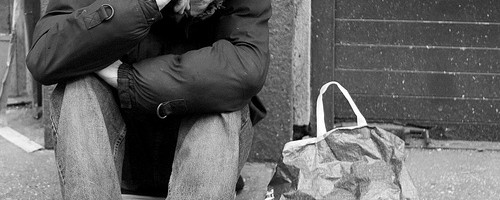I will be the first to tell you that freedom means everything to me. I do not appreciate anyone telling me what to do, and I admit that I sometimes have trouble with rules, especially the ones that make no sense. I celebrate the concept of free will and I dance to the tune of my ideas as a way of life. Think what I want, live how I love, engage with what I enjoy is my motto! And I have spent much of my life assisting those who have trouble with self-expression to overcome it. Free yourself up, express your feelings, learn to enjoy and live life to the fullest I encourage! So the prospect that someone else should have the power to make a decision for me is utterly revolting. But what if you are not of sound mind? I am a psychologist and the question requires an answer. Should another individual or a state have the power to make a decision about how an individual leads his/her life? Should an individual’s free will be confiscated? I was just wondering……………
I recently left my Cape Cod home where a major controversy is brewing over the homeless population. The homeless, it seems, have become a blight to the community, a community that relies on tourism to thrive. Main Street in Hyannis, Massachusetts has become the living room to the homeless. They walk the streets, they populate the park areas, lying on the greens and benches. One evening after dinner at a downtown cafe, I noticed a homeless man sitting on the bench in front of the restaurant. An unwelcome advertisement for the restaurant, I thought, yet the poor man most likely had never actually eaten there.
Because of the growing homeless population, the local authorities have been identifying their camps, creating a great deal of controversy. Some were located next to schools and the town spent many hours razing these camps where they found used hypodermic needles and other drug paraphernalia, and a great deal of waste product. The camp conditions were deplorable and found to be extremely unsanitary, a definite health risk. While the materials in the camps were removed, the officials were acutely aware that they would most likely be reconstructed again elsewhere.
The problem is that probably 100% of these individuals are alcoholics/addicts, mentally ill, or both. They are simply trying to survive in the best way they can given their impaired judgement. That is, they are trying to survive while also supporting their addictions, being unwilling, of course, to give them up. Some agencies in town have even assisted them to continue to live this way. One agency gave out free needles, so this homeless and sick population could prevent infection from HIV, hepatitis C and other diseases. Seeing this as a do-gooder service, this agency overlooked the fact that this was enabling them to continue their dangerous and demoralizing lifestyle and habits. This agency looked the other way when it came to clearly seeing the conditions in which the homeless lived with their “clean” needle supply. Apparently it is okay to live in squalor as long as your drug needle is clean. It doesn’t matter that your camp is surrounded by your human waste, filth that causes as great a risk as the infections the clean needles were to prevent. Even slums have some kind of shelters. Even slums, at least in this country, have toilet facilities. Even slums have a place to keep and prepare food.
We have no excuse for the existence of these homeless camps, except that this is what we call free will. They are choosing their own fate, we say. They don’t want any help, we think. We have no right to interfere in another’s chosen direction in life. This is a free country, but just don’t rain on our parade. Don’t use Hyannis as your living room. Hide your squalor better so that we don’t see it and the tourists don’t see it and then everybody will be happy. Make a camp deeper into the woods. Enjoy your drugs all you want but out of our sight.
From my perspective, the de-institutionalization of mental patients that occurred about 25 years ago is not working. Most of the homeless today would have been institutionalized 25 years ago. They would have had a shelter, warmth in winter, clean clothing, and a balanced diet. Those with addictions would be removed from their supply. Those with mental illness would be receiving the treatment they need.
But the question still lingers. This seems to be the cost of freedom, and for the majority of these homeless individuals, and it is a very high cost. The chance of them ever finding a better way of life is virtually nil. But I pose the question to you, my readers of sound mind, what would you choose now when your brain is neither addled with drugs nor with hallucinations? I know that if I were to ever be so lacking in judgment I would hope that someone would rescue me. Most likely in such a sick state of mind it would be against my will. But I do not ever want to live in the conditions of the homeless I have recently seen. But you readers of sound mind, what would you chose? Would you choose freedom or protection? I was just wondering…



